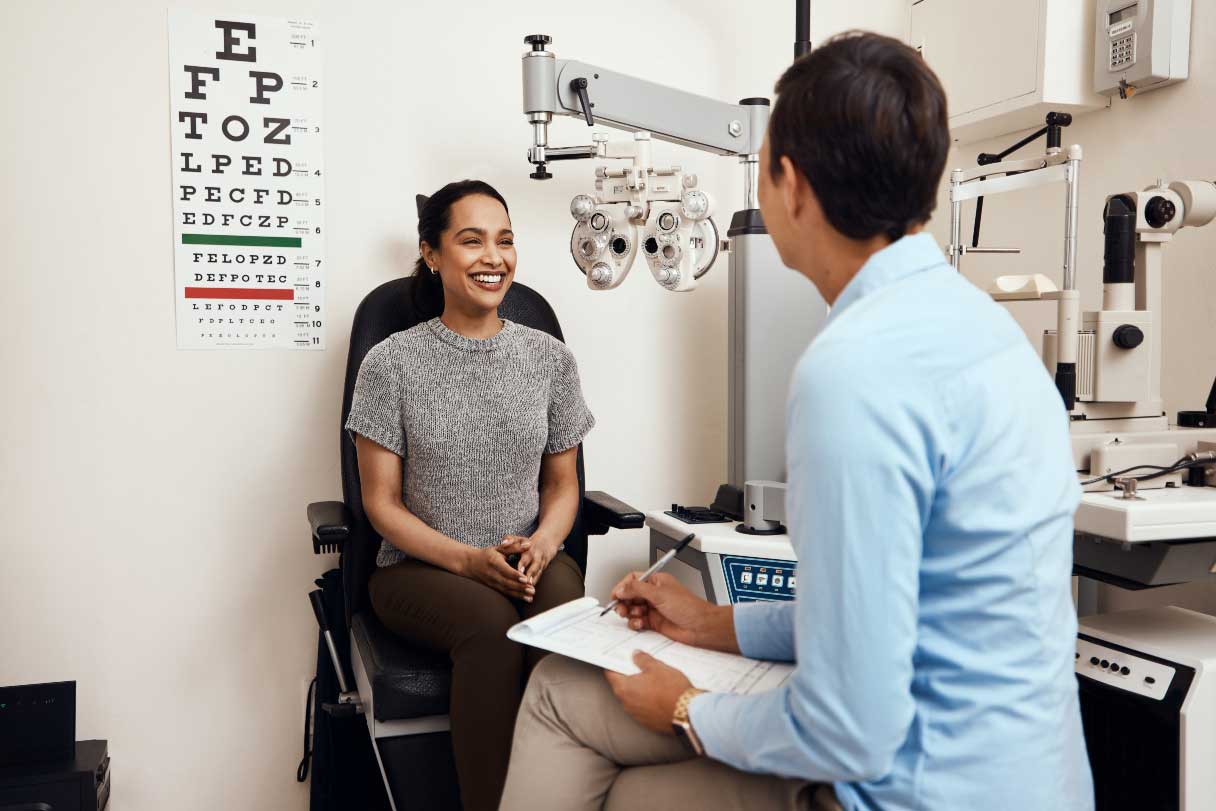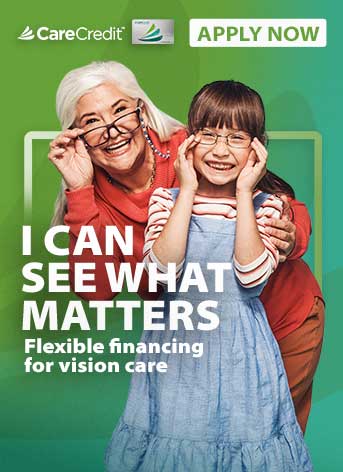If you wear eyeglasses or contact lenses, you're probably no stranger to the optometrist's office. But even if you haven't experienced any problems with your sight, it's a good idea to schedule regular eye exams. That's because over 90 million Americans are at high risk for developing vision problems and visual impairments.1 Fortunately, eye exams can help detect and prevent vision problems from developing or getting worse.
An eye exam can detect signs of eye disease, like cataracts or glaucoma, and may help detect other health issues like diabetes or high blood pressure, even before symptoms appear.
Learn more below about what happens at an eye exam, and how to prepare for one.
What Happens at an Eye Exam?
During an eye exam, your doctor will perform a series of eye tests to determine the health of your eyes and evaluate the quality of your vision.
These tests will involve various machines evaluating your eyes, bright lights being shined into your eyes and having to look through lenses to read letters of different sizes on a chart to determine how well you can see.
The doctor will also test the pressure inside your eyes with special machinery and numbing drops. In addition, your doctor may dilate your eyes to get a closer look at them under special lights.2
At the end of the exam, your doctor will give you a prescription for corrective lenses if you require them, and go over a treatment plan for any eye diseases you may suffer from.3
How Long Does an Eye Exam Take?
A standard eye exam could last up to 90 minutes, but typically ranges between 30 and 60 minutes. If the exam includes an array of different eye tests to thoroughly check your eye health due to a history of eye issues, expect the exam to last closer to 90 minutes or more.4
How Often Should You Get an Eye Exam?
The American Optometric Association recommends that adults have an eye exam every two years until age 60, and once each year after that. More frequent eye exams are recommended for people with certain medical conditions, like diabetes, and certain risk factors, including a family history of eye disease such as cataracts or glaucoma.5
People who take prescription medications with known vision side effects like dry eye, or who are exposed to working conditions that could potentially expose their eyes to excessive strain or eye injuries, may also need more frequent eye exams.2
Eye exams for children
Children should get their eyes examined by a doctor starting at birth and then again between 6 and 12 months of age. Between the ages of 1 and 5, children should get their eyes checked by their pediatrician during their regular exams. These exams will check your child's eyes for healthy development.6
Starting at age 5, bring your child for annual exams with an eye doctor to have their eyes checked for both healthy development and visual acuity.2 Nearsightedness is most likely to show up starting at this age.6 Children with serious eye issues may be referred to an ophthalmologist for a more comprehensive eye exam.6
Ages 20 to 29
For those without any serious vision issues, health issues like diabetes, eye diseases or eye injuries, get a comprehensive eye exam with an ophthalmologist at least once in your 20s. Those who wear corrective lenses or who have eye issues may want to get an exam annually.4
Ages 30 to 39
For those without any serious vision issues, health issues like diabetes, eye diseases or eye injuries, get a comprehensive eye exam with an ophthalmologist at least two times in your 30s. Those who wear corrective lenses or who have eye issues may want to get an exam annually.4
Ages 40 to 60
Starting at age 40, get a comprehensive eye exam with an ophthalmologist because this is the age that eye diseases may emerge. After this, get an exam annually or every two years.4
Ages 60 and older
Starting at age 60, get a comprehensive eye exam with an ophthalmologist every year. During these exams, your doctor can help diagnose and treat age-related conditions such as:4
- Cataracts
- Glaucoma
- Diabetic retinopathy
- Age-related macular degeneration
How Long Does an Eye Exam Take?
How long your eye exam takes will vary based on the health of your eyes. Generally, an eye exam can take from 30 minutes to several hours, depending on what tests the doctor performs. More basic tests will take less time than more in-depth ones.2
5 Tips to Prepare for an Eye Exam
The more prepared you are for your eye exam, the more likely you are to be relaxed, helping to ensure a pleasant and productive experience.
- Write down any questions you have about your specific eye exam and your eye health.
- Don't hesitate to contact your eye doctor's office with your concerns before your exam.
- Prepare to answer questions the eye care provider may have about your medical history and any family history of vision problems.2
- Make and bring along a list of the names and dosages of any medications you take.
- Bring any prescription or over-the-counter vision aids you might use, like reading glasses, with you.2
How you prepare for your eye exam may also depend on who you are going to see.
What is an ophthalmologist?
An ophthalmologist is a doctor with the most advanced medical training when it comes to the care of your eyes. They treat advanced eye conditions such as glaucoma, cataracts, eye infections, optic nerve problems, ptosis and pterygium. They also perform surgery to remove cataracts and vision-correcting procedures like LASIK eye surgery.7
A visit to an ophthalmologist will usually take around 90 minutes or more because your doctor will perform visual acuity tests and tests of your eye health. Your doctor will dilate your eyes during the exam to more closely examine them.4
If your child has been referred to an ophthalmologist, bring along sunglasses for them as their eyes will be sensitive to light after they are dilated. Note that if they are going to school immediately after the exam, they may have trouble with schoolwork because their vision will also be blurry. The effect can last several hours.2
What is an optometrist?
An optometrist is a doctor trained in evaluating and treating the overall health of your eyes. They can test the accuracy of your vision, diagnose and treat some vision problems and perform minor surgical procedures.7
Generally, if you have not been diagnosed with a serious health condition like diabetes or diabetic retinopathy, and if you don't have a family history of eye diseases like glaucoma, you'll see an optometrist for your annual eye exam. An optometrist will still perform medical testing on your eyes, including tests for glaucoma that require numbing drops and dilation of your eyes, as well.7
Prepare as you would for a trip to the ophthalmologist for you or your child.
What is an optician?
An optician is not a doctor but has specialized training to help measure and adjust eyeglasses, fill eyeglass and contact lens prescriptions and help you choose new eyeglasses.7
Opticians won't give you an eye exam but can help if you or your child needs an adjustment to their glasses, needs to be fitted for glasses or contacts or needs help choosing eyeglasses, an optician can help. Be sure to bring your prescription from your optometrist or ophthalmologist before visiting an optician.
Should You Bring Your Glasses for Your Eye Exam?
Yes, you should bring your glasses for your eye exam. Your vision provider will check your glasses to determine your current prescription. They will also let you know if your prescription has changed and make recommendations on getting new lenses or glasses.3
Should You Wear Your Contacts for an Eye Exam?
No — when heading to your eye exam, you won't want to wear your contacts but you will want to bring them along. Remember to remove your contacts at least two hours prior to your eye exam so that your eyes return to their normal state and your doctor can properly examine them. However, if you are going in for a follow-up contact lens exam, then feel free to wear them.8
Should I Bring Sunglasses to an Eye Exam?
Yes. The doctor may dilate your eyes during the eye exam, which makes them much more sensitive to light for several hours, so it's best to bring along a pair of sunglasses if you are getting your exam done during the day when it's very bright outside.9
How Do You Find the Best Eye Doctor?
To find a good eye doctor for your annual eye exam:2
- Consult with your primary care physician to determine if you need to see an optometrist or an ophthalmologist, based on your health history.
- Your doctor or your vision insurance plan can provide a referral to an eye doctor in your area, as can friends and family.
- You may also want to check with local hospitals to see which eye doctors practice at their facilities.
- For children, ask your physician or local hospital for a referral to someone who specializes in pediatric eye care.
How Much Does an Eye Exam Cost?
The average eye exam costs around $100.10 Contact lens examinations may range in price between $120 and $250.11
Does Health Insurance Cover an Eye Exam?
Your health insurance may cover the cost of your eye exam if it is considered medically necessary. This means that it would be performed to treat a medical condition such as conjunctivitis or glaucoma.10 Otherwise, you may need a separate vision insurance policy to cover some or all of the costs of your exam.
How Can I Pay for My Eye Exam?
Being financially prepared for your eye health can also give you peace of mind. To pay for your eye exam, you can use:
- Cash or debit cards
- Standard credit cards
- Your health savings account (HSA) or flexible savings account (FSA) if you have one.12
- The CareCredit credit card*, accepted at many vision providers around the country.
CareCredit Financing for Eye Exams
Regular eye exams are an important part of your eye health. Whether you're getting an eye exam or needing eye surgery, the CareCredit credit card can help you pay for care where your insurance leaves off.* Apply today and use our Acceptance Locator to find a vision specialist near you that accepts CareCredit. Continue your wellness journey by downloading the CareCredit Mobile App to manage your account, find a provider on the go, and easily access the Well U hub for more great articles, podcasts, and videos.
Author Bio
Susan Paretts is a freelance writer with 18 years of experience covering health and wellness, pet care, and more. Her work has been published by the American Kennel Club, Bayer Animal Health, Elanco, LIVESTRONG.com, The San Francisco Chronicle, Chewy, and more.








